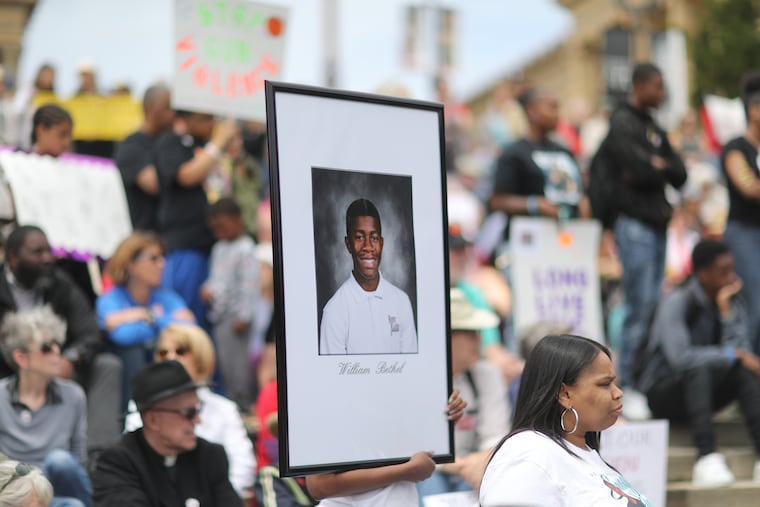When will the millions Philly spends on antiviolence actually work | Helen Ubiñas
A year into the process of evaluating Philadelphia's violence prevention programs, the city's Office of Violence Prevention has few answers.

With apologies to Sixers fans everywhere: Don't trust the process — especially when it comes to city government.
Last year I suggested that we start evaluating the city's antiviolence programs, which happened to be around the same time that the city started its Office of Violence Prevention. Better late than never, right?
From the start, there was difficulty in defining just what programs would fall under violence prevention. Same with the money set aside for them, also a moving target. The city initially identified $60 million in federal, state, and city funding spent across 10 departments yearly on community-based prevention programs focused on gun violence. Later, Shondell Revell, who was hired in 2017 to head the office, said it was closer to $48 million in city, federal, and state funding, with $13 million coming directly from the city.
The office went with a softer auditing approach than the one I was pushing, which was: Prove your antiviolence program works — or lose your funding.
But I put hope in plans to hold community meetings with city residents who have long said that the existing programs weren't having an impact on their lives.
I hadn't heard anything for months. And then on Thursday afternoon at the Philadelphia Anti-Drug/Anti-Violence Network in North Philadelphia, Mayor Kenney announced that he was giving his administration 100 days to come up with a new approach.
"Get mad about the violence in our streets, get mad about what's happening in our community," said City Council President Darrell L. Clarke.
I'm not sure where Clarke's hanging, but people are already plenty angry about the violence in Philly. And I only got angrier when Deputy Managing Director Vanessa Garrett Harley said that as part of the directive, they'd be evaluating all existing efforts to reduce violence.
Wait. What?
Weren't we already doing this? They said so.
And if we weren't, just what in the world had the Office of Violence Prevention been doing for the last year?
Turns out, they're pretty good at spending money.
First by hiring Theron Pride in June to the newly created position of senior director of Violence Prevention Strategies and Programs. Annual pay: $133,900. Revell, who makes $118,450 a year, also remains on the job. Garrett Harley, who will oversee the efforts as the newly appointed deputy managing director for Criminal Justice and Public Safety, makes $164,800.
And then by spending $300,000 on the Community Crisis Intervention Program, a community outreach program that sounds a lot like other community outreach programs that already exist.
As for the accounting of the programs … well, there was a lot of spin that boiled down to this: Trust them and their newly hired expertise.
Brian Abernathy, the city's newly named managing director, said the office got to a point where it needed to make adjustments; it didn't have the staffing.
Translation: The office was out of its depth — and rather than clean house, it invested more money in a renovation.
In the meantime, let's just blindly continue to fund programs. No, let's continue to blindly fund more programs.
One guy, promoting his own program at the news conference, told city officials that they were BS'ing themselves if they kept addressing gun violence in the same old ways.
Worse, I thought, they're conning the residents of Philadelphia as they hire more experts, form more task forces, and give chest-pounding, 100-day directives that don't amount to anything but headlines that the dead rarely make.
Shootings are up since last year. Same with homicides; 246 people have been murdered in Philly as of Sept. 27. We had the most violent August in at least a decade.
Thursday morning, hours before city officials packed a room to announce they'd come up with yet another plan to combat violence in 100 days, an 18-year-old was gunned down.
That night, a 15-year-old was shot.
Maybe sometime in the next 100 days, someone from the city can find the time to visit their families. You know, tell them to buck up and trust the process.